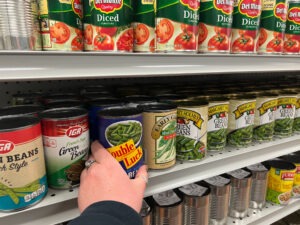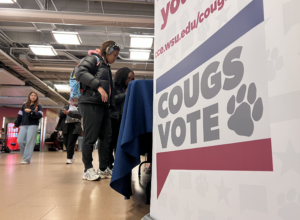
Now bowl eligible, Cougs hang onto narrow path to CFP
More Murrow News Stories PULLMAN, Wash — Washington State University football is bowl-bound after their latest win, moving them to an impressive 6-1 record. Now this guarantees WSU a spot



COLFAX, Wash. – Panic buttons, bulletproof glass, biohazard boxes and security officers.
Those are some of the protections Whitman County Auditor Sandy Jamison is taking to safely and securely prepare for this year’s upcoming general election. “I think everyone who works here does feel a little more secure now that it’s just kind of tightened up,” said Mishellena Stanley, Whitman County election supervisor.
Panic buttons will be installed under each election worker’s desk before November and will immediately alert the sheriff’s office when pushed, Jamison said.
The observer window and reception area window have been upgraded to bulletproof glass, and the door leading to the processing room is also bulletproof. Security will be hired as an additional precaution.
Biohazard boxes are used if the county receives a suspicious letter, in response to some state counties receiving white powdery substances last year, some of which tested positive for fentanyl.
To fund security improvements, Whitman County qualified for a grant administered by the Washington Secretary of State’s Office during the 2024-2025 fiscal year. The grant provides up to $80,000 to statewide election offices with an active Albert sensor, which monitors networks for cyber threats. Whitman County will receive the full $80,000 reimbursement, according to Charlie Boisner, director of external affairs for the Office of the Secretary of State.
However, since the county also bought a backup high-throughput scanner and tabular, they exceeded the state funding cap and are responsible for covering the remaining costs. Plagued by a couple of “crazies” during each general election season, Jamison said the office is taking precautions to safeguard election workers.
Usually these “crazies” come into the office with a long list of notes, Stanley said, questioning the election integrity process and disagreeing with how the election staff counts ballots.
In some instances, voters are asked to leave, though Stanley attributes mental health as to why some are acting out.
“We could not continue working because they were so disruptive,” Stanley said. “So, then they proceeded to bang on the windows outside.”
More than a third of local election officials have experienced threats, harassment and abuse due to their jobs, according to a Brennan Center for Justice report released in May. Since 2020, 92% of those officials have taken steps to increase election security for voters and election workers.
Yet, Jamison said this is rare for Whitman County.
She doesn’t feel threatened, but instead sees these tense moments as a teaching opportunity to share how ballots are counted and processed at the office.
“For the most part they’re angry, not at us, but they take it out on us because they’re angry about the culture and how they feel the election is going,” she said.
Paul Bolls is the director of research laboratories at the Murrow College of Communication and co-director of the Murrow Media Mind Lab at Washington State University.
His research specializes in how the human brain processes and is impacted by media content. Bolls said that as people read media content, they experience emotional arousal – the intensity of human emotion – which fuels behavior.
When people read something that fires them up, like political coverage, he said it’s more likely to push someone toward “extremist political behavior,” including threatening an election worker.
“When political media content is so emotional, it pushes the buttons on that sympathetic nervous system, eliciting arousal that can be hard to down-regulate,” he said. He recommends people learn how to regulate their emotions and practice media literacy skills.
“If they can improve their media literacy and understand how to navigate the political media environment in a more intelligent way, that would take a big step toward reducing those kinds of incidents,” Bolls said.
Deb Olson, voter service chair for the League of Women Voters of Pullman, said that while she hasn’t experienced any threats during her 16 years with the League, she did encounter yelling and hostile people while door-knocking and campaigning before joining the organization.
“The best thing to do is be as non-confrontational as possible and bring the temperature down,” Olson said. “Because if you ask, ‘Why are you doing this?’ and they have to think about it, they might change their mind.”

More Murrow News Stories PULLMAN, Wash — Washington State University football is bowl-bound after their latest win, moving them to an impressive 6-1 record. Now this guarantees WSU a spot

More Murrow News Stories PULLMAN (Murrow News 8) – With many students experiencing food insecurity, Washington State University’s food pantry, located on the first floor of the Compton Union Building






Note: Murrow News is produced by students of the Edward R. Murrow College of Communication at Washington State University. Northwest Public Broadcasting proudly supports the work produced by these young journalists.
If you have any issues/concerns please feel free to reach out to Instructor, Matt Loveless or Department Chair, Ben Shors.
©2022 Washington State University Board of Regents – Edward R. Murrow College of Communication.






